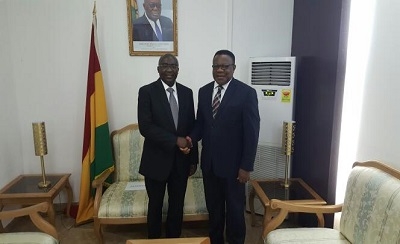
Accra, 26 April 2017 (ACBF) – Ghana’s Vice President H.E Dr. Mahamudu Bawumia has underscored the centrality of Capacity development in the transformation of Africa, praising the African Capacity Building Foundation (ACBF) for delivering on its mandate to offer topnotch technical and knowledge support to African countries and institutions to leverage the continent’s sustainable development. H.E Dr. Bawumia made his remarks during a recent audience he granted the Executive Secretary of the Foundation – Prof. Emmanuel Nnadozie, in Accra – the city that hosts the West and Central Africa Regional Office of ACBF.
Describing the ACBF as “a well-known Pan-African Institution that has made huge achievements through its capacity development investments on the continent,” the Ghanaian Vice President said the development of Africa’s institutional and human capacity to deliver on the continent’s development goals was of utmost importance. Hence, he noted, it was urgent for member States of the ACBF to fulfill their pledges towards meeting all the financial needs of the Foundation’s new Strategic Plan, in order for the Foundation to continue with its indispensable mandate.
“My country will therefore play a leading role in promoting the Foundation’s activities which are key in spearheading Africa’s development,” he said.
It was a reassured Executive Secretary of the ACBF who thanked the Ghanaian leadership for the country’s pledge to the Foundation’s previous strategic plans and its commitment to ACBF’s current Strategic Plan for 2017-2021, built on the following four strategic pillars: enabling the effective delivery of continental development priorities, supporting countries to achieve tangible development results, enhancing private sector and civil society contributions to sustainable development, and leveraging knowledge and learning to increase development effectiveness in Africa.
Prof. Nnadozie stated that the total value of financial contributions towards the delivery of the Foundation’s program by Member States reached 20% of the required funding for ACBF during the 2012-2016 strategic period but that “such contributions continue to be decisive as they demonstrate Member States’ commitments and contribute in leveraging resources from other donors.”
“ACBF’s request for Member States to honor their pledges, is also clearly in line with our new approach of going beyond making investments on capacity development in the form of grants, to providing more strategic services to member States, such as providing capacity development services and undertaking joint resource-mobilization for capacity development activities, which would result in more beneficial and more sustainable ways of enhancing development at this critical time,” he added.
ACBF’s Support to Ghana
ACBF is supporting some of the key institutions in Ghana to leverage capacity for the country’s development. These include: the Centre for Policy Analysis (CEPA), Ghana Economic Policy Analysis and Research Institute (GEPARI), the Institute for Statistical, Social and Economic Research (ISSER) based in the University of Ghana and the Institute for Democratic Governance (IDEG). The support is targeted at enhancing both technical and institutional capacities for the organizations.
The country has also benefitted from ACBF’s support to regional projects such as the African Women Development Fund (AWDF), the West African Monetary Institute (WAMI), the Public Sector Management Training Program (PSMTP) based at the Ghana Institute of Management and Public Administration (GIMPA); and the Economic Policy Management Training program based at the Department of Economics, University of Ghana.
Continuing campaign
Prof. Nnadozie’s Ghana visit, follows his recent call on the President of Liberia – H.E Ellen Johnson Sirleaf who also made a strong commitment to champion the cause for supporting the ACBF in its critical work on helping Africa to achieve its continental and country-specific priorities for economic development through a robust overhaul of its capacity for development.
He will continue to engage other African leaders for their commitment to capacity development on the continent in general and in their respective countries in particular.
-ENDS HERE-
For more information, please contact:
Abel Akara Ticha – Senior Communication Officer
The African Capacity Building Foundation
Harare, Zimbabwe
+263 7+263-4 304663, 304622, 332002, 332014; Ext. 279
Email: [email protected]
About the African Capacity Building Foundation
Established in 1991, ACBF builds human and institutional capacity for good governance and economic development in Africa. To date the Foundation has empowered people in governments, parliaments, civil society, private sector and higher education institutions in more than 45 countries and 6 regional economic communities. ACBF supports capacity development across Africa through mobilization and leveraging of resources for capacity development; grants, investments and fund management; knowledge services; promoting innovation in capacity development and capacity development advisory services. The establishment of ACBF was in response to the severity of Africa’s capacity needs, and the challenges of investing in indigenous human capital and institutions in Africa. ACBF interventions are premised on four principles: the centrality of capacity to the development process in Africa; the critical role of a partnership and demand-driven approach in tackling capacity challenges; African ownership and leadership in the capacity development process; and a systematic, sequenced and coordinated approach to the capacity development process that pays attention to capacity retention and utilization. For further information go to: www.acbf-pact.org





